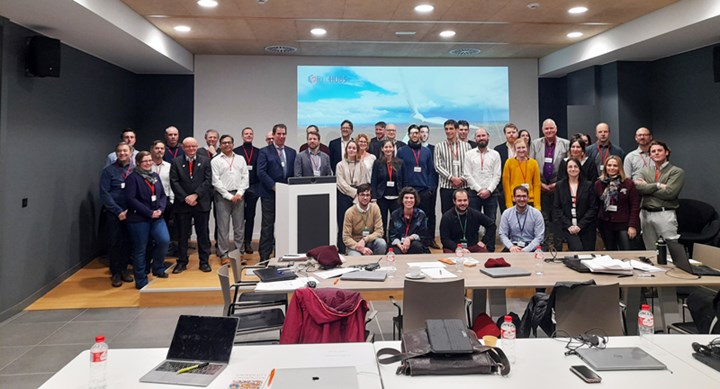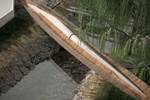European project EoLO-HUBs targets wind turbine blade recycling
The 18-member consortium will develop and use green chemistry processes to recycle composite materials and, among others, optimize the dismantling of wind farms through advanced software.

The EoLO-HUB consortium. Photo Credit: Aitiip Technology Center
The EoLO-HUBs project, co-financed by the EU and endowed with almost €10 million, is to demonstrate an innovative sustainable solution to recover high-value composite materials from wind turbine blades through the development of a set of advanced recycling technologies. The project’s 18 consortium partners have met at project coordinator Aitiip Technology Center’s (Zaragoza, Spain) facilities to kick off the project, which will be carried out over 48 months.
The recycling of a wind turbine’s fiber-reinforced polymers (FRPs) is a complex process. EoLO-Hubs responds to these industrial needs, focusing on three areas of development:
- An innovative process to optimize the dismantling of wind turbine blades, including advanced software and tools that will facilitate the identification and separation of the different components of the blade when being treated;
- Development of two sustainable technologies: low-carbon pyrolysis and green chemical solvolysis, for the recovery of glass and carbon fibers;
- State-of-the-art treatment processes: Improvement of the properties of the recovered fibers to train them as new raw materials in a second life cycle in the automotive, construction and wind sectors.
A digital platform will also be developed that will link the hubs circumscribed to the EoLo project to make the exchange of knowledge effective. Two hubs that integrate the integral process of dismantling, recycling and recovery of wind farms in two complete value chains, and a third that will connect the advances of EoLO-HUBs with society and industry. This platform will also serve as a space to formalize, from the circular economy, business agreements that help replicate the EoLo model beyond the pilot framework.
EoLO-HUBs is coordinated by Aitiip, and involves 18 European partners from seven countries:
- ECHT Regie in Transitie B.V. (Netherlands)
- Nordex Energy GmhH (Germany)
- Moses Productos SL (Spain)
- Mitsuibishi Chemical Advanced Materials GmbH (Germany)
- Teruel Airport (Spain)
- Advantis APS (Denmark)
- Franhofer-Gesellschaft zur Förderung der Angewandten Forschung E.V. (Fraunhofer Society, Germany)
- Jansen Recycling Group B.V. (Netherlands)
- Mondragon Goi Eskola Politeknikoa Jose Maria Arizmendiarrieta S Coop (MGEP, Spain)
- Saint-Gobain Placo Iberica SA (Spain)
- Global Equity & Corporate Consulting SL (Spain)
- TNO Netherlands Organisation for Applied Scientific Research and its joint innovation center Brightlands Materials Center (Netherlands)
- Centro Ricerche Fiat SCPA (Italy)
- Polymeris (France)
- National Composites Centre (NCC, U.K.)
- University of Leeds (U.K.)
- The Manufacturing Technology Centre Ltd. (MTC, U.K.).
Related Content
-
Novel composite technology replaces welded joints in tubular structures
The Tree Composites TC-joint replaces traditional welding in jacket foundations for offshore wind turbine generator applications, advancing the world’s quest for fast, sustainable energy deployment.
-
How composites have become a necessity
Composites used to be one of many material options across industries and applications, but that's not the case anymore.
-
Honda begins production of 2025 CR-V e:FCEV with Type 4 hydrogen tanks in U.S.
Model includes new technologies produced at Performance Manufacturing Center (PMC) in Marysville, Ohio, which is part of Honda hydrogen business strategy that includes Class 8 trucks.












